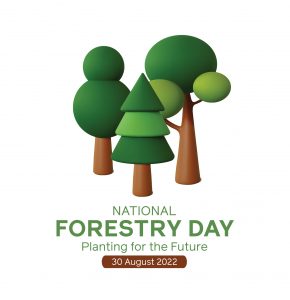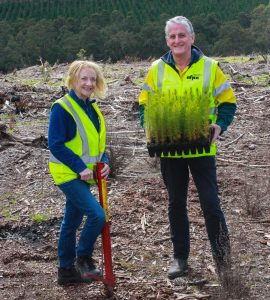 Yesterday was Australia’s National Forestry Day – a day to celebrate all the great work done by Australia’s forest industries. From growing trees that absorb carbon and making sustainable and renewable products, all while creating new jobs and underpinning communities, the contribution of Australia’s forest industries should be celebrated. Source: Timberbiz
Yesterday was Australia’s National Forestry Day – a day to celebrate all the great work done by Australia’s forest industries. From growing trees that absorb carbon and making sustainable and renewable products, all while creating new jobs and underpinning communities, the contribution of Australia’s forest industries should be celebrated. Source: Timberbiz
Forest industries are responsible for:
• $24 billion of national economic contribution annually
• 80,000 direct local jobs and another 100,000 indirect jobs
• Planting more than 70 million new trees every year that absorb carbon, helping fight climate change
• Supplying essential and renewable products, from house-frames and structural timber to furniture and floorboards and paper and cardboard
“Our homes and offices are full of forest products. From the house-frame in the walls and roof, to the timber floors and benchtops, right through to paper in the printer and toilet paper in the bathroom, we cannot live without forestry,” Australian Forest Products Association CEO Ross Hampton said.
“Australia’s forest industries are also helping fight climate change, with trees absorbing carbon as they grow and locking it up in the products that are made.
“This National Forestry Day let’s celebrate all that’s good about Australian forestry and be proud of the environmental, economic and social contribution they make nationwide,” he said.
Victorian Forest Products Association CEO Deb Kerr said Australia should be proud that aside from creating essential products, Victoria’s forest industries were helping fight climate change, with trees absorbing carbon as they grow and locking it up in wood products.
“Forestry is also responsible for careful land and forest management and stewardship, while Australia’s native forest industries are the most highly regulated and sustainable on earth. Every tree we harvest is replaced and regenerated,” she said.
“This National Forestry Day, let’s celebrate all that’s good about Victorian forestry and be proud of the environmental, economic and social contribution they make state- and nationwide.”

Federal Member for Forrest Nola Marino with WA Forest Industries Federation WA Chair Ian Telfer.
In WA Forest Industries Federation WA Chair Ian Telfer said National Forestry Day was a celebration of Australia’s sustainable forest industries and all the associated benefits they provide.
WA’s sustainable forest industries will plant over six million plantation tree seedlings this season, to cater for record demand for timber and timber products.
Amid the celebrations for National Forestry Day, the State Government is being reminded of its commitment to expand the plantation industry.
Most of this season’s seedlings have been and will be planted by industry, as despite the State Government’s $350 million investment in expanding the softwood plantation estate, the number of seedlings planted by the government has decreased this season.
“National Forestry Day is a great time to reflect on how valuable our industries are in the fight against climate change,” Mr Telfer said.
“Not only that, but providing employment, underpinning regional communities and creating renewable and sustainable products.
“Our industry is stepping up to meet the demand for timber, but we need the State Government to do the same and honour its commitment. We are heading towards a major shortfall of timber in the 2030s, worse than what is currently being experienced,” Mr Telfer said.
“Planting now will ensure a supply of timber for future generations, and it should be a priority for Government.
“We need to be establishing a minimum of 10,000 hectares of new pine plantings each year for the next seven years to meet our target of 100,000ha.”
WA’s plantation sector, which consists of hardwood and softwood varieties, contributes over 1.18 billion dollars of economic activity.
Plantation timber is used to make the timber frames for homes, engineered wood products used to build new multi-storey residential and commercial buildings, wood-based panels for kitchens, pallets, and wood fibre used to manufacture paper, packaging and bioproducts, replacing single use plastics. In addition, residues go into making potting mix, mulches, composts and landscaped products for gardens.
Federal Member for Forrest Nola Marino joined Mr Telfer to plant pine seedlings in celebration of National Forestry Day to show support for the industry.
“The South West Timber Hub was one of the first of the regional forestry hubs formed under the previous Federal Government in 2018,” Mrs Marino said.
In New South Wales, Forestry Corporation said that 28 trees would be planted every single minute of every day throughout 2022.
“Wood is the ultimate renewable resource, and the forestry cycle means organisations like Forestry Corporation can keep supplying the community with essential materials for generations to come,” Forestry Corporation Chief Executive Officer Anshul ChaudharyChaudhary said.
“The benefits don’t just stop there — forestry is also a powerful tool in the fight against climate change.
“NSW’s two million hectare State forest estate and the renewable wood products it supplies actively sequester and store carbon.
“Across Australia, the forestry plantation estate stores the equivalent amount of carbon as generated by 56 million cars driving for a whole year,” he said.
National Forestry Day also highlighted the positive impacts of the state’s native forestry industry and the stringent environment it operated in.
“NSW’s strict environmental regulations mean timber from native State forests is amongst the most sustainable in the world with the forests careful managed to provide timber while also supporting wildlife populations in concert with surround national parks and other forested land,” Mr Chaudhary said.
“Native forestry is essential for sustainably supplying wood products for wharves, bridges, telegraph poles and our homes.
“Timber harvesting operations take place in around 0.1 per cent of NSW forested land and all harvested areas are completely regenerated.”
Tasmania’s Minister for Resources congratulated the Australian Forest Products Association and Tasmanian Forest Products Association on initiating National Forestry Day and providing the opportunity to celebrate the importance of the local industry. In Tasmania the industry supports more than 5700 jobs, and is an important supplier of timber, plywood and engineered timber for Tasmania and Australia.







